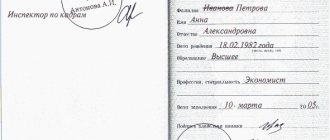From time to time the idea of starting our own “small business” visits almost all of us. However, it is worth understanding that your own business is far from just an opportunity to work for yourself and proudly be called an individual entrepreneur. Business is, first of all, responsibility: to partners, clients, creditors and the state.
An individual entrepreneur, by his legal status, is both an individual and a small business entity. As a business unit, for all its actions related to the implementation of entrepreneurial activities, according to the legislation of the Russian Federation, an individual entrepreneur bears administrative, civil and criminal liability.
It should be noted that with regard to his obligations, an entrepreneur is fundamentally different from the founder of a legal entity. By opening an LLC, its owner limits his liability for the organization’s debts to just a share in the general property of the company. In case of troubles, the individual entrepreneur will pay creditors with all the property belonging to him, no matter whether it is involved in the activities of the company or is for personal use. The common family property of an unsuccessful businessman is no exception.
How to avoid trouble with the law
It goes without saying that individual entrepreneurs must comply with current legislative norms in their business activities. What specific responsibilities follow from this general formula?
- Know current regulations and monitor changes in tax, criminal, social and other legislative areas.
- Document all financial procedures.
- Complete the necessary documentation correctly and on time.
- In those types of activities that require a license, permit, patent, certificate, etc. settlement, do not neglect this special documentation.
- To formalize labor and financial relations with hired employees without errors (if the individual entrepreneur uses their labor).
- Pay due taxes, fees and contributions on time and in full.
- Report on your activities according to the established scheme.
Question: An individual entrepreneur sells at retail in a store he owns previously purchased chocolate containing cocoa, code 1806 of the EAEU Commodity Code for Foreign Economic Activity, the country of origin of which is Ukraine. If the customs authority conducts an inspection, then under what article of the Code of Administrative Offenses of the Russian Federation is it possible to hold him accountable? View answer
NOTE! Different types of liability - financial, criminal, administrative - threaten individual entrepreneurs for:
- failure to take proper actions;
- implementation is not complete;
- completion within an unspecified time frame;
- illegal actions.
Question: Who and to what extent is responsible for the obligations of an individual entrepreneur after his death? View answer
Determining the type of responsibility
It is necessary to distinguish between the scope of responsibility and its type. The scope is determined by one or another Code, within the framework of which the rights and obligations of an entrepreneur are defined by law: this can be the Civil, Tax, Labor or Criminal Codes of the Russian Federation. The type of liability implies a certain form of penalties provided for certain violations within any of the listed areas. They may be as follows:
- financial liability – compensation for damage, moral harm, lost profits, property losses;
- administrative liability - imposition of fines, penalties, penalties, interest, as well as restrictions on activities;
- criminal liability - forced labor, arrest or prison sentence (real or suspended).
FOR YOUR INFORMATION! The same offense may result in different forms of liability; the most common choice is between administrative or criminal. The decision is made by the court based on the characteristics and scale of the violation.
Question: An individual entrepreneur (sales office) closed the office without notifying employees. The office continues to be closed for several days, making it impossible to perform work duties. Should employees record the fact of obstruction of work activities? Is it possible to bring an individual entrepreneur to administrative liability? View answer
The obligation of self-employed citizens to notify the tax authorities about the implementation of activities.
In this case, the legislator also provided for the obligation of self-employed citizens to notify the tax authorities about the implementation or termination of their activities. There is a special form for this (Order of the Federal Tax Service of Russia dated March 31, 2017 No. ММВ-7-14/ [email protected] “On approval of the form and format of notification of an individual about the implementation (termination) of activities providing services to an individual for personal, household and (or) other similar needs, as well as the procedure for filling it out”).
According to clause 7.3 of Article 83 of the Tax Code of the Russian Federation, registration (deregistration) of an individual who is not an individual entrepreneur and provides services to an individual for personal, household and (or) other similar needs without the involvement of hired workers, in this capacity is carried out by the tax authority at the place of residence (place of stay - if an individual does not have a place of residence on the territory of the Russian Federation) of this individual on the basis of a notification submitted by him to any tax authority of his choice about the implementation (termination) of activities to provide services to an individual for personal, household and (or) other similar needs.
Financial liability of individual entrepreneurs in the civil sphere
The freedom of an individual entrepreneur lies in the fact that he conducts business at his own discretion, which can also be understood as “at his own peril and risk”: he is responsible for his activities independently.
Obligations for which the individual entrepreneur bears full responsibility must be enshrined in certain documents:
- contracts;
- accounts;
- acts;
- receipts, etc.
They are supported not only by the will of the businessman himself, but also by his personal funds and property, no matter how much of it is invested in the business. There is no bankruptcy procedure for individual entrepreneurs: damage caused to partners will have to be compensated at their own expense.
Question: An individual entrepreneur who pays taxes on taxes was taken into custody, which is why he was unable to pay the tax on time. The court acquitted the individual entrepreneur, and after that the individual entrepreneur paid the tax. The tax authority held the individual entrepreneur accountable for failure to pay NAP on time. Is this legal if the offense was not the fault of the individual entrepreneur? View answer
Exceptions from the property of individual entrepreneurs subject to liability
Art. 24 of the Civil Code of the Russian Federation removes essential items from the list of property sold as compensation:
- housing, if the individual entrepreneur has one;
- the land under it (if it is privately owned);
- home furnishings;
- household items;
- wardrobe;
- products.
Material sanctions may be imposed on an individual entrepreneur for:
- causing property losses;
- profit lost due to his fault;
- violation of contract terms regarding time or quality.
All these unfulfilled or inadequately fulfilled contractual obligations will be considered as such if only they appeared in official documents. Otherwise, responsibility will remain only on the conscience of the individual entrepreneur: it is unlikely to prove the legality of the claims in court without documentary evidence.
IMPORTANT! Failure to fulfill the obligations of an individual entrepreneur can “get away with it” if the reason is not in his actions or inaction, but in force majeure circumstances (natural disasters, social disasters, etc.).
Opening and closing an individual entrepreneur with debts
It is easy to open an individual entrepreneur with debts; legislative regulations in this regard do not provide for any restrictions. There is no need to collect documents; the Federal Tax Service itself receives the necessary data upon request to the Pension Fund and the Social Insurance Fund.
Modern practice provides that an entrepreneur will need a document confirming the absence of debts when re-opening his status, including after writing off debts and completing the bankruptcy procedure.
Are you an entrepreneur and need legal help with debts? Contact us, we will help you get rid of debts and overdue obligations through the court with minimal consequences.
We will write off debts from individual entrepreneurs through bankruptcy
Our lawyer will call you in a few minutes and answer all your questions
our team
Vladislav Kvitchenko
CEO

Tatiana Smirnova
Senior bankruptcy lawyer persons
- Grigory Nechaev
Bankruptcy lawyer persons
- Oleg Martin
Financial analyst
- Yaroslav Mitkov
Junior bankruptcy lawyer persons
Responsibility under the Labor Code
The requirements of labor legislation apply to individual entrepreneurs if he acts as an employer. When hiring employees, the individual entrepreneur bears full responsibility for them.
- The very first act of responsibility is the formalization by concluding an employment contract and the ensuing obligations:
- registration with a pension fund;
- compulsory insurance;
- "white" salary.
- Material support: each employee has the right to receive the agreed remuneration on time.
- Material and administrative liability for errors in labor organization and moral damage in the event of:
- illegal dismissal;
- wrongful removal from work;
- delay in issuing work permits;
- causing damage to employee property.
IMPORTANT INFORMATION! In court, it is enough for the employee to prove the very fact of causing harm; he is not obliged to prove the employer’s guilt (Article 1064 of the Civil Code of the Russian Federation).
Who has the right not to register as an individual entrepreneur.
Individuals who provide services to individuals for personal, household or other similar needs without the involvement of hired workers may not be registered as an individual entrepreneur. Such individuals are usually called “self-employed citizens.”
The Tax Code establishes the following types of citizens:
- supervision and care of children, sick persons, persons over 80 years of age, as well as other persons in need of constant outside care according to the conclusion of a medical organization;
- tutoring;
- cleaning of residential premises, housekeeping.
In addition, constituent entities of the Russian Federation can independently establish other types of services for personal, household and (or) other similar needs. Income of “self-employed” citizens received in 2021 and 2021 from individuals for the provision of these services is exempt from taxation if the individual has been registered.
The Federal Tax Service of Russia draws attention to the fact that “self-employed” citizens do not include: 1) foreign citizens engaged in labor activities for hire from individuals for personal, household and other similar needs not related to business activities; 2) foreign citizens who are employed by organizations or individual entrepreneurs, as well as by notaries engaged in private practice, lawyers who have established law offices, and other persons engaged in private practice in accordance with the procedure established by the legislation of the Russian Federation.
Administrative responsibility
The Code of Administrative Offenses is directly related to individual entrepreneurs, since they are equated to officials, unless otherwise established by other acts. Individual entrepreneurs are most often brought to this type of liability in court, where the plaintiff is the regulatory body.
Administrative penalties in the labor sphere
Basically, 2 types of punishments are used: “strike with a ruble” and disqualification.
- The fine will be issued to the businessman for violating the legislation on labor protection and organization. The sizes are determined by separate articles of the Code of Administrative Offenses and the Labor Code of the Russian Federation.
- Disqualification - a ban on engaging in certain activities for 1 to 3 years can be applied in case of repeated violations.
Economic violations and punishments
Monetary offenses dictate appropriate sanctions. Individual entrepreneurs are subject to fines for:
- work outside of registration, without a license or permit;
- failure to inform or untimely provision of information about a change in any registration data (for example, about moving);
- violation of consumer rights is the most serious liability: they can be punished not only with a fine, but also with a 3-month suspension of activity and/or confiscation of goods;
- errors in cash discipline.
Pay taxes and sleep peacefully (tax liability of individual entrepreneurs)
Tax legislation is particularly sensitive to violations and punishes negligence in the state treasury quickly and inevitably. Punishments are established in court or out of court if the amount of the fine does not exceed 5 thousand rubles. 1 tax violation per reporting period.
How are individual entrepreneurs punished for tax violations?
- fines in a fixed amount (for failure to provide documents, distortion of information, violation of financial accounting, missed declaration deadlines, etc.);
- fines in the form of a percentage of the amount of underpaid tax;
- penalties for late payments;
- blocking a bank account for delays in tax returns.
Property not subject to foreclosure
The legislation contains clear and defined boundaries of what cannot be recovered for losses caused to individual entrepreneurs. The list includes:
- The only residential premises used by the defendant or his family for residence. The exception is the premises, which at the time of foreclosure work are mortgaged and pledged by the bank. It is not considered to belong entirely to the person and, if necessary, can be seized.
- Land plots on which a residence is located or which were not used by a citizen to conduct private business. Also, subsidiary plots cannot be confiscated if they are not related to running a business.
- Personal items. The exception is items classified as luxury (jewelry, jewelry, antiques).
- Household items (furniture, utensils, home appliances).
- Products at a certain cost.
- Tools used in professional activities, worth up to 100 minimum wages. Volumes above these may be described.
- Fuel used by the debtor and his family to heat the living space.
- Personal transport in a situation where the defendant has a disability and the transport is adapted to transport him.
- Awards, medals, cups, souvenirs and other items of this kind cannot be confiscated.
Other property may be confiscated. In this case, there is a certain order: first of all, the recovery is directed to funds in Russian rubles, then they resort to searching for the defendant’s foreign exchange reserves, and only after that attention is paid to other property. This is due to the need to sell non-monetary assets, which poses a certain difficulty when recovering losses.
Criminal liability for individual entrepreneurs
The Criminal Code implies a larger scale of violations that could be administrative, but they can already be interpreted as crimes. In other words, these are the same offenses as in the administrative sphere, but on a larger scale and with regrettable results.
IMPORTANT! Criminal liability excludes administrative liability, and vice versa: both types of liability for the same violation are impossible.
Crime in labor relations
- Failure to comply with labor safety rules, resulting in serious injury or death to the employee.
- Refusal to hire a woman because she is pregnant or has young children - the punishment can be administrative or criminal (forced labor for up to 180 hours).
- The absence of employment contracts with employees, if there are many of them, which entails great financial damage to the state, can actually, and not conditionally, imprison you for 2 years.
Economic crimes IP
- Violation of registration rules or lack thereof. For working without permits or licenses, providing false information in documentation, especially repeatedly, criminal liability is possible.
- Operations with unmarked goods that are subject to mandatory labeling. The punishment, along with administrative fines, can be imprisonment for up to 3 years with confiscation of six months of income.
- Illegal lending (false information in documents) or malicious non-payment of loan obligations can be fraught with arrest or long-term community service.
- The use of other people's details, trademarks and other similar designations will entail corrective labor for 2 years.
- Non-payers of customs duties may, in addition to paying a fine, go to prison for up to 2 years.
- Large-scale tax violations can result in imprisonment of up to 1 year.
Illegal cashing
Sometimes organizations involve individual entrepreneurs in the process of cashing out income that they want to hide from taxation or obtained illegally. To achieve this, the following frauds are carried out: the owner of the “unlaundered” funds enters into an agreement with the individual entrepreneur for services or the supply of goods. In this case, a product or service is selected that is difficult to track, for example, rental, repair, intellectual property, software, etc. In fact, they often don’t turn up, and the goods are not sold, but the individual entrepreneur receives a large amount of money for them in his account. By withdrawing them as income, he keeps the agreed percentage and returns the “laundered” amount to the owner.
If an individual entrepreneur is involved in the process of “laundering” illegal income, he may be held accountable under one or more articles of the Criminal Code of the Russian Federation:
- tax avoidance;
- aiding in the concealment of taxable funds;
- forgery of documents;
- false entrepreneurship;
- legalization of illegal income.






